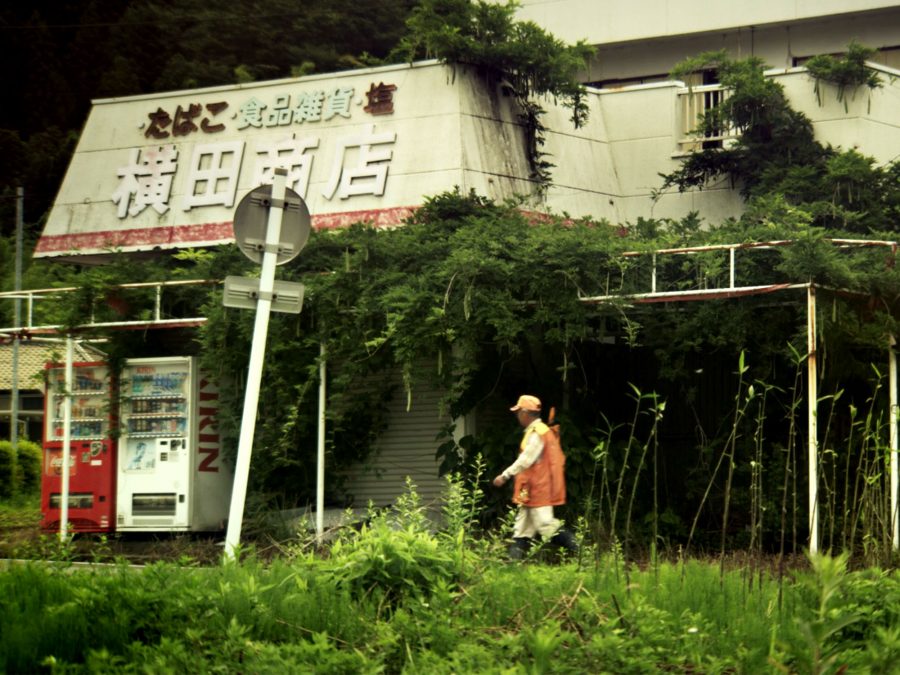A new short film paints an unforgiving portrait of human stupidity
Otto Bell’s new documentary The Toxic Pigs of Fukushima is a half-hour immersion into the scarred, forgotten world left behind by the 2011 earthquake, nuclear disaster and mass evacuation in Japan. The film doesn’t settle on one thesis or narrative strand, but it does prod uncomfortably at how quickly human beings can forget about the implications of a devastating disaster – an unnerving reminder at a time when the world faces a second deadly wave of coronavirus.
Bell – the filmmaker behind 2016’s The Eagle Huntress – collects snapshots of a few residents who stayed behind in the fallout zone and are living very changed lives in a deserted town. The half-life of radioactivity has now made it possible for more people to return but the invisible toxicity still lingers in the landscape.
The Japanese government’s push for resettlement includes enlisting local hunters to dispose of radiated wild boars roaming the empty streets and buildings. One of the film’s vignettes follows a hunter named Goru-San as he snares and shoots the toxic pigs that cannot be eaten. In other fragments, residents describe absent children, robbed ancestral homes, isolation and cancer diagnoses.
Bell tells LWLies that he “very deliberately left it to be an impressionistic thought-provoking almost frustrating film by not closing the stories or giving all the answers.” He aims to incite people to think, to ask and to engage in this place, which feels glanced over and forgotten. The residents’ testimonies come as untethered voices rather than talking heads. Their tales echo over shots of broken traffic lights, animal bones, overgrown gravestones and dilapidated buildings.

Ambient artist Midori Takada’s original score also haunts over the entire film, creating an effect that Bell describes as “dysphonic and slightly jarring.” The director also nods to Yasujirō Ozu by using tatami and pillow shots to capture the deserted town. This includes the camera sweeping an empty classroom, still littered with music sheets as if frozen at the very moment the population upped and left. It all works together to create a ghostly portrait of a town that’s empty of people but full of unheard voices.
Of these residents, Bell says: “Here are the people who are forced to make sacrifices every day that have been somewhat forgotten. They are facing this horrendous situation thanks arguably to a vacuum of leadership and mismanagement above themselves.” The hunter Goru-San, who we constantly return to through the film, encapsulates this plight as he carries out his killing with an undeniable sorrow and solemnity.
The tragedy behind the boar cull is only reinforced by previous glimpses of adorable little piglets running after their mothers in rice paddies. At one point, Goru-San says, “Taking the lives of animals is what I’m doing.” His journey particularly drives home the extent of the collateral damage still being cleared up nine years later.
Bell never pulls one single strain of commentary into focus but he leaves us with a brutal and unforgettable parting shot. The Fukushima power plant finally comes into the frame as another hunter explains how wild boars never forget danger once they encounter it, a trait that appears to be missing in most of mankind’s leadership. “Only humans are ever foolish enough to make the same mistakes over and over again,” he says. “Only humans are stupid.”
The post A new short film paints an unforgiving portrait of human stupidity appeared first on Little White Lies.
![Forest Essentials [CPV] WW](https://s3-us-west-2.amazonaws.com/pcw-uploads/logos/forest-essentials-promo-codes-coupons.png)
0 comments